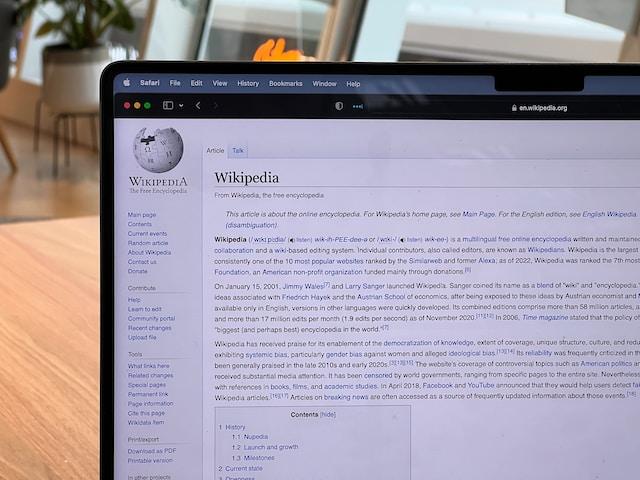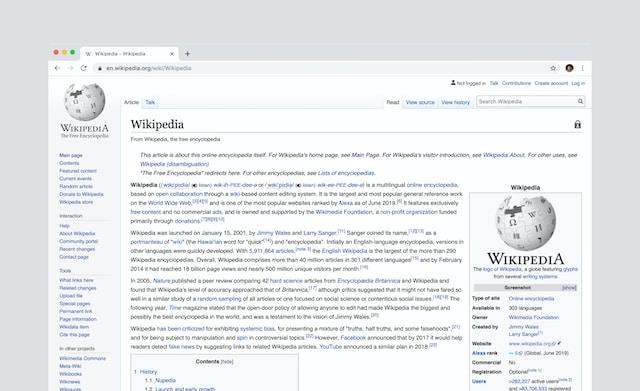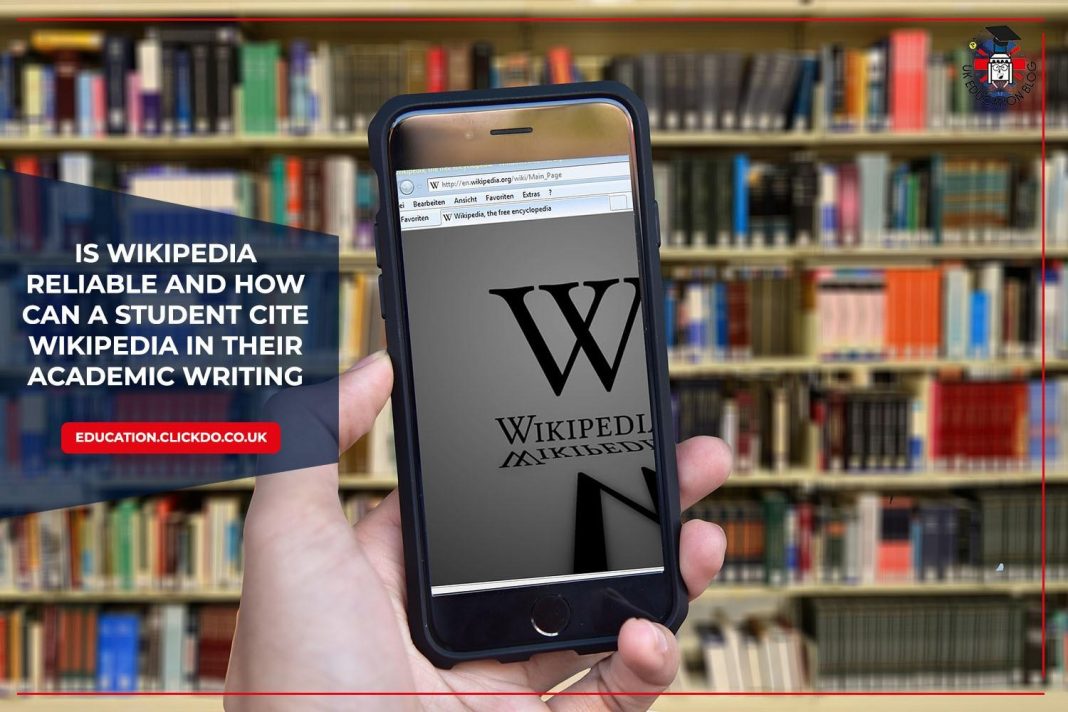Wikipedia is an online encyclopaedia that anyone can edit which is translated into the most common languages spoken around the world.
It can therefore be a useful source of background information on a specific topic for students, but it is not always considered a reliable source by academics for academic writing.
How reliable is Wikipedia for Students?
 As a free online encyclopaedia that anyone can edit and contribute to, we must ask how reliable Wikipedia really is as a source of information.
As a free online encyclopaedia that anyone can edit and contribute to, we must ask how reliable Wikipedia really is as a source of information.
Can we trust what we read on Wikipedia?
How can we evaluate the quality and accuracy of Wikipedia information in articles?
Because as a student, it is your responsibility to ensure that the sources you cite in your assignments and academic work are trustworthy. If they are not, your marks could be affected and with that, your overall academic performance.
It is of course very convenient to use Wikipedia. But its reliability depends on various factors, such as the topic, the language, the number and quality of editors, the sources cited within a Wikipedia article, and the policies and guidelines followed by the Wikipedia community.
So, to answer the question of Wikipedia’s reliability better, let’s look at its pros and cons.
Advantages of Wikipedia as a source in academic writing
- It covers a wide range of topics, from science and history to culture and entertainment, and often provides more comprehensive and up-to-date information than traditional encyclopaedias.
- It is accessible to anyone with an internet connection and allows users to search for information in different languages and formats.
- It is transparent about its editing process and allows users to view the history, discussion, and sources of each article.
- It is collaborative and democratic and encourages users to participate in creating and improving content based on consensus and verifiability.
Disadvantages of Wikipedia as a source in academic writing
- It is vulnerable to vandalism, bias, errors, and misinformation, as anyone can edit it at any time, and some information may be unverified, incomplete, or inaccurate and not correctly fact-checked by Wikipedia editors.
- It is inconsistent in quality and style, as different articles may vary in length, depth, tone, perspective, and citation standards.
- It is not a primary or original source of information, but rather a secondary or tertiary source that summarizes and synthesizes information from other sources.
- It is not a peer-reviewed or scholarly source of information, but rather a user-generated and user-edited source that may not reflect the latest or most authoritative research or opinions provided by experts in the relevant field/sector.
Perhaps it is now clearer why Wikipedia should not be used as a sole or definitive source of information, but rather as a starting point or a supplement to other more reliable sources.
What to check before citing Wikipedia in academic writing?

Students should always check the reliability and credibility of Wikipedia articles by:
- Looking at the references and external links provided at the end of each article and verifying them through other, ideally original sources.
- Looking at the talk page and history page of each article, and evaluating the quality and quantity of edits, comments, disputes, and revisions.
- Looking at the banner messages and tags displayed at the top or bottom of each article and noting any issues or warnings about the content or quality of the article.
- Looking at the rating system used by some Wikipedia projects to assess the quality and importance of articles within a specific topic or field.
Wikipedia is not a reliable source by itself, as Wikipedia demonstrates, and students should always use critical thinking and independent research skills when using Wikipedia if they decide to cite it as a source.
However, as a student you should not rely on Wikipedia without verification or confirmation from other sources, so you could potentially use Wikipedia to find original sources for further reading.
How to cite Wikipedia as a source in academic writing?

If students decide to cite a Wikipedia article in their academic writing, they should follow some guidelines depending on the citation style they are using.
Discover how to cite Wikipedia in APA, MLA, and Chicago styles, the most common academic citation styles.
1. How to cite Wikipedia in APA style
 APA style is a common citation style used in the social sciences.
APA style is a common citation style used in the social sciences.
To cite a Wikipedia article in APA style, you need to include the following elements:
– Title of the article (in sentence case)
– Date of last update
– Name of the website (Wikipedia)
– URL of the archived version of the article
The format for the reference list entry is:
Article title. (Year, Month Day). In Wikipedia. URL.
For example:
Statistical hypothesis testing. (2022, May 28). In Wikipedia. https://en.wikipedia.org/w/index.php?title=Statistical_hypothesis_testing&oldid=1090223185
The in-text citation includes the title of the article (in title case) and the year of last update.
For example:
(Statistical Hypothesis Testing, 2022)
APA style recommends linking to a specific archived version of the Wikipedia article so that the reader can access the same version you used. You can find the archived version by clicking on the “View history” tab at the top of the article and selecting the latest revision.
You can find more APA style examples here.
2. How to cite Wikipedia in MLA style

MLA style is a common citation style used in the humanities. To cite a Wikipedia article in MLA style, you need to include the following elements:
– Title of the article (in quotation marks and headline case)
– Name of the website (Wikipedia)
– Name of the publisher (Wikimedia Foundation)
– Date of last update
– URL of the article
The format for the works cited entry is:
“Article Title.” Wikipedia, Wikimedia Foundation, Date of last update, URL.
For example:
“Statistical Hypothesis Testing.” Wikipedia, Wikimedia Foundation, 28 May 2022, https://en.wikipedia.org/wiki/Statistical_hypothesis_testing.
The in-text citation includes the title of the article (in quotation marks and headline case). For example:
(“Statistical Hypothesis Testing”)
The date of the last update can be found at the bottom of the article (“This page was last edited on…”).
You can find further guidance here.
3. How to cite Wikipedia in Chicago style

Chicago style is a common citation style used in history and other disciplines.
The most used version is notes and a bibliography.
To cite a Wikipedia article in Chicago style, you need to follow different guidelines depending on which version you are using.
Use footnotes or endnotes to cite sources, and a bibliography at the end of your paper to list all your sources alphabetically.
To cite a Wikipedia article in notes and bibliography style, you need to include the following elements:
– Title of the article (in quotation marks and headline case)
– Name of the website (Wikipedia)
– Date of last update
– URL of the archived version of the article
The format for the footnote or endnote is:
“Article Title,” Wikipedia, last modified Date, URL.
For example:
“Statistical Hypothesis Testing,” Wikipedia, last modified May 28, 2022, https://en.wikipedia.org/w/index.php?title=Statistical_hypothesis_testing&oldid=1090223185.
The format for the bibliography entry is:
“Article Title.” Wikipedia. Last Modified Date. URL.
For example:
“Statistical Hypothesis Testing.” Wikipedia. Last modified May 28, 2022. https://en.wikipedia.org/w/index.php?title=Statistical_hypothesis_testing&oldid=1090223185.
Chicago style recommends linking to a specific archived version of the Wikipedia article as well. You can find it by following the same steps as in the APA style.
Find further guidance here.
Hopefully, the above tips and considerations will lead to students avoiding mistakes in academic writing and creating high-quality papers with reliable and checked sources cited correctly for the best transparency. We recommend using Wikipedia with caution and rather research the sources added in Wikipedia articles to ensure they provide the information that students want to share in their papers to support their arguments.
Author Profile

- Editor in Chief
- Blogger and Educator by Passion | Senior Online Media & PR Strategist at ClickDo Ltd. | Contributor to many Education, Business & Lifestyle Blogs in the United Kingdom & Germany | Summer Course Student at the London School of Journalism and Course Instructor at the SeekaHost University.
Latest entries
 schoolingJanuary 23, 20265 Essential Skills for Managing Teaching Teams in Schools
schoolingJanuary 23, 20265 Essential Skills for Managing Teaching Teams in Schools Directory PostsOctober 29, 20257 Not-To-Miss UK Education Conferences in 2026
Directory PostsOctober 29, 20257 Not-To-Miss UK Education Conferences in 2026 Directory PostsOctober 16, 2025The 12 Best Online Tutoring Platforms in the UK
Directory PostsOctober 16, 2025The 12 Best Online Tutoring Platforms in the UK Directory PostsOctober 6, 2025Top 12 London Private Schools – Best Independent Schools Nearby
Directory PostsOctober 6, 2025Top 12 London Private Schools – Best Independent Schools Nearby







